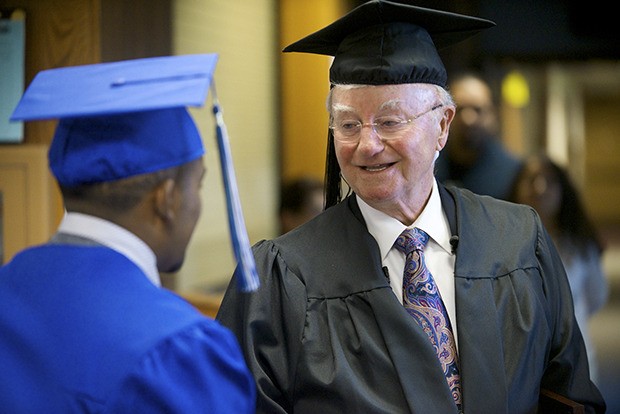It was 68 years in the making, but Henry Friedman has finally got his high school diploma.
A Holocaust survivor, Friedman lost his childhood in the 1940s, when Jews were prohibited from attending school. He survived the nightmare by hiding in a barn, and received a piecemeal education from the family’s retained teacher. But he never received a diploma, and on Oct. 8 the Kent School District rectified that.
The 86-year-old Friedman received an honorary KSD diploma at a ceremony honoring early graduates from Kent-Meridian, Kent Phoenix Academy and Kentwood high schools.
Pat Gallagher, a teacher at Kent Phoenix Academy, recommended that the district award Friedman the diploma after his 26-year post-retirement career of speaking at public schools about his experiences during the Holocaust.
Dressed in a black robe and mortarboard, Friedman addressed the assembled crowd of reporters, parents, district officials and students.
“You are looking at a person who has risen from the ashes,” he said. “It was against the law for me to live.”
Friedman grew up in Brody, Poland, tending to his father’s farm and textile business. In 1942, it was pure happenstance that a young girl overheard Nazi Gestapo talking about picking up the family next to put them on trains. Understanding what would happen, the girl ran a mile through woods and snow to the farm to warn the Friedman family, who went to their neighbors for refuge.
The family disappeared from existence, hiding in the barns for two years. The family’s retained teacher, Clara Singer, also escaped with them and made a lasting impression about the value of education on Friedman.
“I have received many awards,” Friedman said, “but this is something special.”
Friedman grew up, married and raised a family of his own. He attended his children and grandchildren’s high school and college graduations, but realized that he had never been to a graduation of his own.
“It always felt like I had missed something,” he said.
After the war, Friedman traveled around Europe as a displaced person, working jobs where he could find them until 1948, when he immigrated to America. At the time his resume included tap dancing, shoe polish sales and clothing importer.
Arriving in the states with few possessions and resources, and not even speaking English, it wasn’t long before the 22-year-old Friedman was drafted into the U.S. Army, where he served for two years. Despite Friedman’s only tentative grasp of English, his First Sergeant asked him to deliver an anti-communism speech before a deployment to Japan. It was the start of a career in speech.
An epiphany
After the Army, he used his speaking talents to sell jewelry wholesale and made a great career of it. But it took a near-death experience to get him into his work speaking at high schools.
It was 1988, and Friedman was in a car accident on Mercer Island. He had been angry with God for many years, but while on the ambulance, he had an epiphany.
“I said to God, ‘I was not ready yet,'” he said.
Over the next few months, he retired from his work as a salesman and transitioned into speaking at Washington high schools about the Holocaust. He remembers his first speaking experience, where the teacher felt almost guilty by association of her German ancestry. Friedman extended an understanding hand to her, reconciling that nothing her family did was her or her grandmother’s fault.
“Any normal human being would have a very difficult time believing what happened without being there,” he said. “When I tell my story, I have to pinch myself. How did I survive? For a normal human being it’s very difficult to understand.”
His underlying message when speaking comes back the importance of education, love and hope. First, he emphasizes, learn all you can, because that will be the biggest factor in improving your life. An informed citizenship is a powerful citizenship, he said. Second, let go of hate. Friedman said he spent many years angry at his family, at God and at the world for what happened to his people, and has finally learned to let it go because “hate is a poison in your blood.”
Lastly, he hopes his message will give hope to those he speaks to, to not give up, no matter how bleak the future looks. While in hiding, he fought with his father on studying religion, and while he resented it, he also realized later that it helped sustain his hope that eventually the nightmare would end.
“No matter how bad today is,” he said, “tomorrow may be a better day.”
=====
PHOTO BELOW: Henry Friedman, a Holocaust survivor, received his high school diploma after a 68-year wait. ‘I have received many awards,’ he said, ‘but this is something special.’
ROSS COYLE, Kent Reporter

Talk to us
Please share your story tips by emailing editor@kentreporter.com.
To share your opinion for publication, submit a letter through our website https://www.kentreporter.com/submit-letter/. Include your name, address and daytime phone number. (We’ll only publish your name and hometown.) Please keep letters to 300 words or less.
